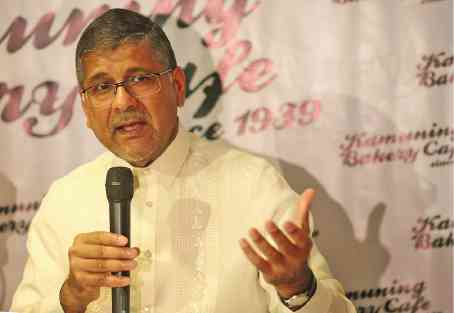UK envoy: Fight vs drugs goes beyond rehab beds, bullets

UK Ambassador Asif Ahmad weighs in on the issue of extrajudicial killings targeting drug suspects, which have practically become daily fare under the Duterte administration. —PHOTOS BY JOAN BONDOC AND RAFFY LERMA
The top British diplomat in the country urged the government to look at the drug problem as something more complex than a criminal menace, saying it may persist long after law enforcers had “run out of bullets.”
While Ambassador Asif Ahmad agrees with President Duterte on the need to address the drug issue, he noted that the country has “no other choice” but to go beyond its criminality aspect and address it as a health and social concern.
“This is the reality of the problem,” he told the Inquirer at the Pandesal Forum in Kamuning, Quezon City. “Let’s say you put people in drug rehabilitation centers. What are you going to do with them (after they get rehabilitated)?”
Complex issue
Without addressing the complexity of the issue, rehabilitated users may simply return to their communities and face the same factors that had led them to drug abuse, he said.
Article continues after this advertisement“[The country may] run out of hospital beds, run out of rehab centers, run out of bullets, before we can really solve the problem,” he said.
Article continues after this advertisementFor one, the government should look into the working conditions in certain industries where people resort to taking drugs just to stay awake and work longer hours, he added.
Drug addiction is also a major problem in the United Kingdom, he said, but “for us, the use of arms is the last resort.”
“In our system, there is no place for extrajudicial killings (EJKs) or unexplained deaths,” he added.
One price to pay
“Here, I don’t see [public officials] saying they are actively promoting EJKs…But if in the course of trying to address the problem people are killed, that is one price to pay.”
“We don’t think that’s necessary and justified,” he stressed.
Ahmad, who was posted in Manila in July 2013, recalled visiting a drug rehabilitation center in Taguig City. “I saw an army of people really dedicating themselves [even] with meager resources, but are dealing with kids as young as 12 and with adults as old as 70. How do you deal with [them with a] limited number of people?”
“In the use of drugs, there is a preexisting mental condition,” he noted. “So you need people who are healthcare workers who know how to deal with these problems.”
